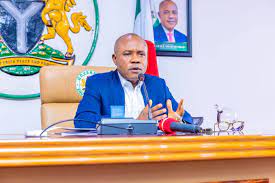The House of Representatives Committee on Finance on Friday, came down hard on the Nigeria Bulk Electricity Trading (NBET) Company, for dragging the country into Power Purchase Agreements that were detrimental to the interest of Nigeria.
This was also as the committee ordered management of the Niger Delta Power Holding Company (NDPHC), to immediately commence a review of the Gas Purchase Agreement (GSA) between the Nigerian government and a company, for the supply of gas to its Calabar power plant, as it has been discovered that the said company was using the same platform to supply gas to other companies, when the country still pays the $10 million monthly commitment as contained in the initial agreement.
“NDPHC, can you please affirm to us, that by Monday, you will review, all I want to hear from you is to review that agreement because that company now has new customers. Please come back here and tell us, that the $10 million has now dropped to $3 million. Nigeria can manage that”, Chairman of the committee, Hon. James Faleke told Mr Chiedu Ugbo of the company, which he agreed to act on.
The committee was angered that in about 12 of the Power Purchase Agreement entered into by NBET under the ‘Take or Pay’ arrangement, Nigeria’s monthly commitment in one of them alone was about $30 million, whether the Transmission Company of Nigeria (TCN) was able to evacuate for onward delivery to the DISCOs or not.
Chief Executive Officer of NBET, Nnaemeka Eweluka in response to questions of members confirmed that the said agreements were all entered into without recourse to the Federal Executive Council (FEC), as he argued that they were not like normal procurement processes that may require such based on the recommendation of the BPP, saying they only relied on the advice of Attorney General of the Federation, while the Minister of Finance signs on behalf of the Nigerian government.
Reacting to the discoveries, Faleke said; “It is all about personal interest, pure impunity. If an investor come and said he wants to invest in power, for that investor to invest in power, he must have carried out his own survey to be sure that consumers are available to consume his power. It’s purely business. What is our responsibility in buying the power from him. Let him; the investor sell the power to the people.
“Nigeria initially felt that, we needed to intervene in the power sector, they provided support. We’re still where we are today. We have millions of Nigerians, out of school but they have no jobs. It is because we have no power to provide industries. And that’s why I asked you; are you satisfied with the value for money? When we have no power for industries to establish, why are we paying such monies.
“My expectation will be that you have provided power for let’s say Ariara market, and there, businesses are booming, or an industrial area in a particular state and industries are booming, but the power is not there. So as operators of these agencies, you needed to carry out a review of where we are. It is interesting that the NDPHC is just saying that they read on the pages papers that a company you signed agreement with, to provide you with gas for $10 million a month, static. Take or pay, we pay the $10 million, and if we don’t pay, the World Bank will pay, and the moment the World Bank pays, your rating will drop; that is the meaning.
“And a Nigerian will sit before us here and tell us that they don’t have to go to FEC or anywhere, you sit down in your office and some people will manipulate you and you just sign agreements on behalf of Nigeria and you commit Nigerians, and the same Nigerians pay you you salaries NBET. It is sheer arrogance and wickedness. We are just starting, by next week it will be more explosive, I can assure you that.
The committee which rescheduled its next sitting for next Monday, has has directed NBET to furnish it with all power purchase agreements entered into since the commencement of the programme, as well as invoices of payments so far made. It further directed the Federal Inland Revenue Service (FIRS), to provide it with records of tax compliance by the companies and agencies involved.




